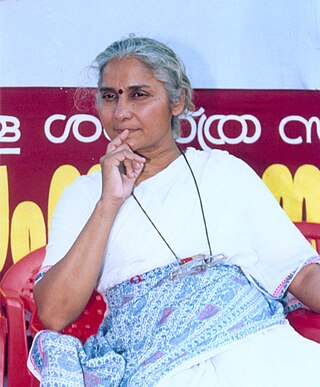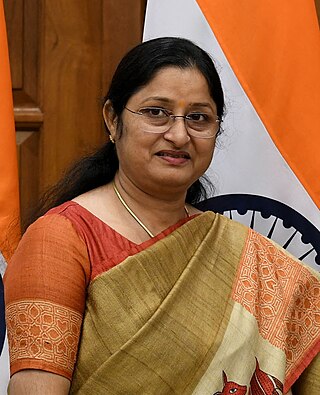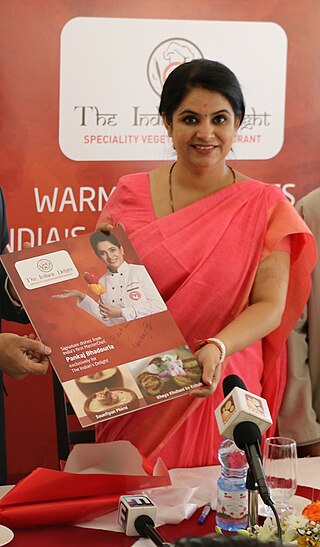
Medha Patkar is an Indian Social activist working on social issues for tribals, dalits, farmers, labourers and women facing injustice in India. She is an alumna of TISS, a premier institute of social science research in India.

Kailash Satyarthi is an Indian social reformer who campaigned against child labor in India and advocated the universal right to education.

The Durbar Mahila Samanwaya Committee, or simply Durbar, is a collective of 60,000 sex workers in West Bengal. Established on 15 February 1992, in Sonagachi, the largest red-light district in Kolkata, West Bengal, India with estimated 11,000 sex workers, Durbar has been working on women's rights and sex workers' rights advocacy, anti-human trafficking and HIV/AIDS prevention. The Durbar states that its aims are the challenging and altering of the barriers that form the everyday reality of sex workers' lives as they relate to their poverty or their ostracism. Durbar runs 51 free clinics for sex workers across West Bengal, with support from organisations such as the Ford Foundation and the National AIDS Control Organisation (NACO), who also help Durbar in its initiatives like networking, rights protection and creating alternative livelihood for sex workers.

Child Rights and You (CRY) is an Indian non-governmental organization (NGO) that works towards ensuring children's rights.
Indian non-governmental organisations (NGOs) can be set up under various Indian laws.

Deepalaya is an Indian non-governmental organization that aids the development of the urban and rural poor in India, with a focus on children. Founded in 1979, it is headquartered in Delhi. Deepalaya primarily serves the urban slums of Delhi, but also works on rural development in the states of Haryana and Uttarakhand. Deepalaya's focus is on sparking sustainable development from within a community.

The Ministry of Women and Child Development, a branch of the Government of India, is an apex body for formulation and administration of the rules and regulations and laws relating to women and child development in India. The current minister for the Ministry of Women and Child Development is Annpurna Devi having held the portfolio since 2024.

Katha is a registered non-profit and non-governmental organisation based in Delhi that works in the field of community development, child welfare, education and literature. It was founded by Geeta Dharmarajan in 1988. It connects grassroots work in education, urban resurgence and story. It calls itself a "profit for all" organisation that moves towards achieving social justice and curb poverty in urban India. It also runs KITES a non-conventional school, which providing information and communication skills to 3000 children in slum area of Govindpuri, Delhi.

Mirai Chatterjee is a leader of the Self-Employed Women's Association, SEWA (India). She joined SEWA in 1984 and was its General Secretary after its Founder, Ela Bhatt.
Vidyaben Shah was an Indian social worker and activist known for her work with children, women and the elderly in India. While she was already serving as Vice-President, she was appointed the first non-officio President of the New Delhi Municipal Council (NDMC) by Prime Minister Indira Gandhi in 1975. She has held several leading positions in the field of social welfare since the 1940s. Vidyaben Shah died at the age of 97 on 19 June 2020 at her residence in Delhi, her son Mihir Shah confirmed the news of Vidyaben Shah death.

Founded in 1999, Alliance India is a non-governmental organisation operating in partnership with civil society, government and communities to support sustained responses to HIV in India that protect rights and improve health. Complementing the Indian national programme, we build capacity, provide technical support and advocate to strengthen the delivery of effective, innovative, community-based HIV programmes to vulnerable populations: sex workers, men who have sex with men (MSM), transgender people, hijras, people who inject drugs (PWID), and people living with HIV.
Laila Tyabji is an Indian social worker, designer, writer, and craft activist. She is one of the founders of Dastkar, a Delhi-based non governmental organization, working for the revival of traditional crafts in India. She was honored by the Government of India in 2012 with the Indian civilian award of Padma Shri. She is the daughter of late Badruddin Tyabji, ICS, who was a senior Indian civil servant and diplomat.
Gutta Muniratnam was an Indian social worker, a member of the National Planning Commission of India and the founder of Rashtriya Seva Samithi (RASS), a non governmental organization engaged in the social welfare activities in over 2500 socio-economically backward villages in the Rayalaseema region, spread across the present day states of Andhra Pradesh and Telangana. He was honored by the Government of India, in 2012, with the fourth highest Indian civilian award of Padma Shri.
Shalini Moghe was an Indian educationist, social worker and the founder of Kasturba Kanya School for tribal children and Bal Niketan Sangh, the first Montessori school in the state of Madhya Pradesh. She was the chairperson of the Bharatiya Grameen Mahila Sangh, Indore, a national level non governmental organization working for the welfare and education of the disabled, orphans, under privileged and the economically weaker sections of the society and was involved with other Indore-based educational institutions such as Prestige Public School and Pragya Girls School. A winner of the Jamnalal Bajaj Award in 1992, she was honoured by the Government of India in 1968, with the award of Padma Shri, the fourth highest Indian civilian award for her contributions to the society.

Rita Panicker Pinto is the founder and director of Butterflies India.

Pankaj Bhadouria is the winner of MasterChef India Season 1 (2010). She was a school teacher who quit a 16-year-old job to participate in the first season of MasterChef India. She has hosted the TV shows Chef Pankaj Ka Zayka (StarPlus), Kifayati Kitchen, 3 Course with Pankaj, Rasoi se- Pankaj Bhadouria ke Saath(ETV), Sales Ka Baazigar (ETV). She was the first MasterChef Winner worldwide to have an official MasterChef Cookbook in her name and has written two more cookery books Barbie- I am a Chef, and Chicken from my Kitchen
Bal Raksha Bharat, commonly known as Save the Children India, is a non-profit organization working to improve the lives of marginalized children in India since 2008. Headquartered in Gurugram, and registered as Bal Raksha Bharat in India, the organization is a member of Save the Children International

Missing Link Trust is a nonprofit organization that uses art and educational campaigns to raise awareness and prevent child sex trafficking. Their work includes public sculpture installations, stencil campaigns, the interactive video game Missing: Game for a Cause, and the interactive online comic Web of Deceit - A missing and trafficking casefile. The organization was awarded the 2021 Stop Slavery Campaigns Award from the Thomson Reuters Foundation.

Tage Rita is an agricultural engineer from Ziro Valley and is India's first kiwi wine brewer. In 2018, she was honored with the Women Transforming India Awards, organized by the United Nations and NITI Aayog.
Chandni Khan born in 1997 (age 26–27) is an Indian activist and editor working for the welfare of street children in different parts of India. She founded the NGO, Voice of Slum along with Dev Pratap Singh. She was the editor of the newspaper Balaknama, literally meaning "voice of children", published in New Delhi. She is also called Chandni Di, the word di meaning "older sister" in some Indian languages.












